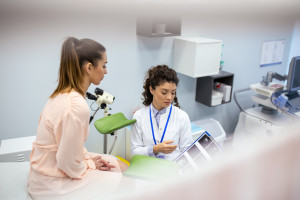Patients are active participants in the treatment process. It pays off for health and the system.

- Patients are not just passive recipients of healthcare, but in order to achieve treatment results, they must be active participants in the process
- Patient co-responsibility affects adherence
- Unfortunately, in Poland, up to half of patients with chronic diseases do not follow the doctor's recommendations.
- Specific system solutions are needed to improve adherence
- This includes educating the patient, increasing awareness of the purpose of the prescribed therapy, and possible side effects. This can be achieved by teams: a doctor, an educational nurse, a dietician, and a psychologist.
- Pharmacists can also play a huge role in education by explaining how to take a given medicine.
- Adherence is also improved by combined therapies, when the patient takes several ingredients in one tablet.
- Systemic changes are needed, including in the regulations on reimbursement and drug programs.
- The participants of the Health Market debate "Patient co-responsibility" discussed the necessary changes in this area.
Up to 50% of patients with chronic diseases in Poland do not follow the doctor's recommendations. Meanwhile, it is adherence that determines whether the treatment will be effective. Hence the great role of the patient's shared responsibility for the therapeutic process. This also translates into the quality and length of the patient's life, but also costs for the health care system.
What can be done, both at the systemic and individual level, to truly improve patients’ compliance with treatment recommendations?
Experts tried to answer this question during a debate organized in June by the editorial office of Rynek Zdrowia.
Participants repeatedly stressed that good communication and education are key.
Prof. Małgorzata Myśliwiec , Head of the Department and Clinic of Pediatrics, Diabetology and Endocrinology at the Medical University of Gdańsk, provincial consultant in the field of pediatric endocrinology and diabetology, stated unequivocally that "communication is the most important thing, because when knowledge is not transferred, or not as it should be, it causes the patient not to follow the recommendations".
That is why it is so important to explain to the patient why and how to use the therapy. Such education can be provided not only by a doctor, because in the case of chronic diseases, the patient is cared for by teams, so the patient can also count on the help of an educational nurse, dietitian or psychologist.
Prof. Myśliwiec gave the example of diabetes, where an educational nurse is responsible for explaining to the patient how the glycemia monitoring system or pump works, a psychologist – why it is worth using certain medications, a dietician presents a nutritional plan, and the effects of the medication, e.g. statins or insulin, should be presented in a simple way by a doctor, who also explains the risks of not using the recommended medications.
- In the case of chronic diseases, these should be teams that will provide great support - she argued, adding that education is needed by patients of all ages, but in the case of children or the elderly, also by their caregivers and loved ones.
- Individualization is also very important. We should get to know the patient - she noted.
In turn, Prof. Piotr Dobrowolski, head of the Independent Lipid Clinic of the National Institute of Cardiology and deputy head of the Department of Epidemiology, Prevention of Cardiovascular Diseases and Health Promotion of the NIK-ard, provincial consultant in the field of cardiology for the Mazovian province, admitted that education is important, but not only of the patient, because doctors are often co-responsible for the lack of adherence.
According to him, doctors must think about achieving a specific therapeutic goal or eliminating risk factors.
- Unfortunately, we have failed in Poland when it comes to prevention (...). We still treat too often those patients whom we should have started treating 10 years ago, to treat cardiovascular risk factors, not complications - he said.
He added that having a patient tested for lipoprotein, a marker that affects the risk of atherosclerosis and which cannot be reduced by medication, motivates the patient to eliminate other risk factors that they can influence.
The mistake, as Professor Dobrowolski said, is that specializations are fragmented and doctors do not approach the patient holistically. As he argued, the effect of treatment should be valued; when the patient achieves the therapeutic goal, the doctor receives payment for achieving this goal. Without this, he pointed out, primary care doctors refer patients with bad results, e.g. LDL, to a cardiologist, without trying to start treatment and achieve an effect.
Dr. Maria Libura , head of the Department of Medical Didactics and Simulation at the Medical College of the Medical Simulation Center at the University of Warmia and Mazury in Olsztyn, pointed out that we assume that the treatment process can be described as a type of contract between the doctor and the patient and that the treatment process is democratic, i.e. the patient takes joint responsibility for their health as an equal partner in the treatment process. Meanwhile, in the current health care system we only have elements of joint responsibility of the patient, e.g. restrictions on the patient's BMI in some drug programs.
- We have elements of shared responsibility, but they work when we have good contact with the doctor, when there is a therapeutic alliance - she stated, adding that this requires very good communication and direct contact. This works well in the case of pediatrics, but worse in internal medicine, where the patient goes to different doctors who do not know him.
She indicated that the worst systemic problem was leaving the patient alone with prescribed medications. - There are many reasons for the lack of adherence, but one of the most important is the fear of what will happen when I take this medication - said Maria Libura, adding that patients focus mainly on possible side effects.
- Doctors practically do not talk about side effects, they do not explain what are the risks of taking the drug, which side effects are normal, which ones pass, which ones are very rare and should not be worried about, and when you should absolutely seek help if a side effect occurs - she emphasized.
Meanwhile, it must be assumed that the common interest of the patient and the doctor is the patient's health, but the effect will only be if the patient is a partner, and this is possible when the team educates the patient well. The patient must understand the balance of risks and benefits, and this is possible thanks to good communication.
Bernard Waśko, director of the National Institute of Public Health PZH - National Research Institute, drew attention to the role of the state model and the feeling that if the state offers us something, we should also give something in return.
As he said, the latest report of the Institute indicates, among other things, how much - in terms of health - depends on us, and how much on the environment in which we live and how the health care system is organized.
- Let's focus on what happens before the patient comes to the doctor. We have a narrow slice of responsibility that begins in the doctor's office. Before the office there is a huge space of activities to achieve (…) - he postulated.
As he added, "Poland has twice the numerical potential in terms of the number of deaths that can be avoided as a result of preventive actions than interventional medicine." As he said, this discrepancy exists in all EU countries, but in Poland it is relatively large, so it requires attention. It will not be possible to fix this without building an attitude of shared responsibility.
Unfortunately - as he said in Poland - lack of trust in the government translates into lack of trust in the healthcare system. It also works the other way around.
According to Prof. Piotr Dobrowolski, Poland is already ready for us to eliminate unnecessary deaths, because as part of the National Cardiovascular Diseases Program, a 10 for the heart has been prepared, which still needs to be "linked" to the Patient's Internet Account.
- Each of us citizens has great power, because 6 out of 10 factors out of 10 for the heart depend on us, not on medicines or doctors - he explained. Thanks to the application, each citizen will receive short and specific messages on what they can do for their health.
Adherence and the costs of the healthcare systemSince adherence translates into costs for the healthcare system, this topic is also important for the National Health Fund as the payer.
- We looked at many diseases to see if the patient fills the prescriptions (…) and there was such a reflection that this information should also reach the doctors treating these patients - said Filip Urbański , director of the Department of Analysis, Quality Monitoring and Optimization of Services, National Health Fund. He added that CeZ is currently running a patient e-profile project to provide such information about each patient.
In turn, the National Health Fund carried out a project in this area five years ago; 40 primary health care facilities were provided with information about 360 patients undergoing treatment for diabetes, whose data indicated that they had stopped buying medications.
- We received feedback on 265 patients, 60% of whom discontinued treatment, half of whom after consulting a doctor, e.g. they switched to another therapy. On the other hand, 30% informed the NFZ doctor that the medicines had run out and they would buy them right away. Half of them agreed to additional consultation with a doctor or to write an e-prescription.
As Urbański assessed, "there is potential to use such information".
Prof. Piotr Dobrowolski pointed out that it is not only the level of a risk factor that matters, but also the time of exposure, which is why it is worth starting interventions in younger populations, because this translates into fewer cardiovascular complications.
- What we have shown in hypertension is that in the case of patients under 30, 65% discontinued therapy after 12 months from the start of hypertension treatment (...). Maybe we should start with them to identify the group that does not take medication. The more complicated the therapy, the lower the compliance with recommendations - he emphasized.
Drug programs and drugs available in the pharmacy - how to improve adherence?Deputy Director of the Department of Drug Policy and Pharmacy at the Ministry of Health, Mateusz Oczkowski, admitted that also in the reimbursement of drugs, it is of great importance whether therapeutic recommendations are implemented by patients, because "most technologies that appear in the Polish reimbursement system are expensive technologies, innovative drugs in drug programs. In these, there is a high regime of therapy, unlike in a pharmacy."
However, the scale of treatment is different, as 300,000 patients are treated in drug programs and 20.5 million people in pharmacies.
- In drug programs, there is no other option than measuring the effectiveness of the patient's treatment and obliging the patient to follow the regimen, come and administer the drug at the center - he said. As he recalled, each program contains a provision that if the patient does not cooperate with the doctor, he is excluded from the program.
He also explained that each drug program and each therapy has a different specificity, and sometimes therapy is abandoned when it is "inconvenient" for the patient who has to appear every two weeks, and there is, for example, an alternative therapy that is administered every month or every two months.
He drew attention to the growing tendency in drug programs to issue medications to patients at home.
- There is such a possibility even for 6 months. And here is a big problem - said Mateusz Oczkowski.
- That is why we are heading towards a revolution and creating a category 4 prescription and adding a new definition of a prescription for inpatient treatment. The patient would receive such a prescription and fill it in an open pharmacy, but the regime would be completely different, because the patient could only have one package. It is not like it is in a pharmacy now, where the patient can buy an unlimited supply. In Poland, we have created a model of hoarding medicines and we want to move away from it completely. Even in the 360-day prescription model, because there is no justification for the patient to have such a large supply of medicines at home, because it affects availability - said the director of the Ministry of Health.
As he explained, the drug policy department is also responsible for "removing the financial barrier" , which is very important in the case of adherence.
He recalled that in 2023 there was a very big change in the scope of co-payment for medicines by patients, because 96% of medicines for seniors were included on the list of free therapies for them. - Has this affected adherence? No, patients still do not take these medicines, because we will not do anything if the patient does not have the will to be treated - he said. In the meantime, this has affected the fact that patients "hoard" medicines even more.
As he said, "there is one more barrier that will be broken this year, which is the possibility of having one prescription filled in several pharmacies."
He pointed out that these solutions will, among other things, result in greater financial liquidity for the National Health Fund, but also greater patient access to therapy.
An easier path for combination therapies- What else are we doing? In the amendment to the Reimbursement Act, we are introducing a new path for complex therapies. Several substances in one tablet. There will be no such demanding path for them - he informed. If monotherapies are already reimbursed in Poland, then in the case of complex therapy using them, the company will submit a regular application and incur a fee of PLN 3,000. This will not be subject to AOTMiT assessment, and the cost of implementation will be much lower.
- Combination therapies according to AOTMiT usually brought savings - he added. The second benefit of such a solution is improved adherence, because patients prefer to take one tablet instead of several.
- What to do with monitoring and improving adherence in the pharmacy? We have an idea here too. The amendment to the reimbursement act includes a provision to include additional information in the reimbursement announcement, such as the number of packages that the patient is entitled to, the duration of therapy for the patient, the doctor who can prescribe a given product and probably also adherence in the scope of expensive therapies - he announced.
- This is a common barrier. Here is an example of obesity drugs. What good is it that a refund application has been submitted for an obesity drug if it has no requirements regarding the treatment of a patient with obesity? A patient who receives a drug for several thousand zlotys is left to his own devices. According to the applicant, we do not even want to discipline him to lose specific kilograms in a specific time unit. And without the possibility of entering such information, we will not be able to implement such therapies - said Mateusz Oczkowski.
As he argued, with such solutions we can improve adherence, but we cannot do anything about the patient's lack of will.
- And sometimes the patient does not realize that he is an incredible beneficiary of this health care system. I call them a reimbursement millionaire, because he undergoes so many therapies, treatment lines that he costs the state a million zlotys. There are a lot of such patients. On his part, social solidarity should be expressed in the fact that he takes the medicine regularly. And we should make patients aware of this - indicated Mateusz Oczkowski.
He added that requirements must be placed on patients and this is the case throughout Europe.
He also pointed out that doctors do not ask patients whether they can afford a given therapy and whether financial barriers will cause them to abandon the therapy.
- It is not necessarily necessary to always go for the most expensive therapies. Because if we have a choice; a patient taking any medication and a patient taking nothing, then I think we have an advantage when the patient takes anything.
Prof. Piotr Dobrowolski admitted that he informs patients in the B101 program, the hypercholesterolemia treatment program, about how much the therapy costs, how much the state pays for a given treatment. But patients who see for themselves that the therapy works, that they do not have disease progression, follow the recommendations better.
Adherence as an element of analysis in AOTMiTAdherence is a factor that is also taken into account by AOTMiT . Dr. n.med. Marta Słomka , head of the Department of Integration of Health Technology Assessment Processes at AOTMiT, reminded that currently 3 reimbursement applications are being considered for the extension of the B101 program.
- We are looking at the direction in which this program should be expanded, whether the reimbursement applications are compliant (…) We are trying to identify the cause of the lack of adherence, whether it is more due to adverse effects (…) or whether there is another basis - she said.
She added that the more compliance there is in the use of basic therapies, the less expensive drugs are needed.
She also referred to the idea of paying for the effect. She admitted that it is worth doing and that this solution is already starting to function, for example, in the KOS Zawał program. - We can see in the system how many patients have achieved a positive change in cholesterol levels - she stated and added that entities want patients to achieve such an effect, because it is associated with a financial bonus for the centers.
- In turn, in the case of pharmacy reimbursement, entities that submit analyses also raise the issue of adherence or compliance, because it is a benefit for the patient and the system when the patient is properly managed. And we also take this into account. Especially with combined therapies , in cardiology, it is very important for entities to demonstrate that their therapy will improve adherence. This is also taken into account when the president of the Agency issues recommendations - admitted Marta Słomka.
This shows that adherence is a system of communicating vessels. Another element of it is pharmacy and pharmaceutical care.
The role of the pharmacist in adherence to recommendationsMarcin Repelewicz , M.Pharm., president of the Lower Silesian District Pharmaceutical Council , secretary of the Supreme Pharmaceutical Council, admitted that pharmacists see all these problems as if through a lens.
- We see patients who do not want to be treated, but went to the doctor because their wife told them to (…), we see that the patient often has the opportunity to have a short conversation with the doctor in a different language, medical language is a difficult language and often the patient leaving the office, receiving various prescribed therapies, does not know exactly how to use it, why to use it, what the effect should be and why, despite achieving an effect, the therapy should be continued. On the other hand, the patient, having brought the cholesterol or lipid level to the expected level, often states that he is already cured and stops taking the medications on his own - he reported.
He also pointed to the financial barrier. - Many patients come to the pharmacy and ask for free medicines, and in the case of other medicines they say: I'll think about it and they don't come back for these medicines - he admitted.
He added that some people give up taking the drug after reading the leaflet, focusing only on possible side effects.
He emphasized the importance of pharmaceutical care and consultation with a pharmacist in the case of a new drug in the patient's therapy to explain what the drug is for.
- Compliance with the recommendations is then 3-4 times better than when the patient is left to his own devices - he argued.
As he added, a patient who is treated badly is a greater cost to the entire healthcare system than when the therapy is well-managed, when the medication is properly set and the patient follows the recommendations. When patients only receive a prescription, without an explanation of how to use a given therapy, they very often buy the medication but use it incorrectly.
Prof. Małgorzata Myśliwiec assessed that the potential of pharmacists in this area is untapped, also when it comes to consultations with a pharmacist in a hospital, where the patient often leaves with a handful of new medications.
Magdalena Kołodziej , president of the MY PATIENTS foundation, emphasized that patients need support from various sides, because they do not know what to do with the leaflet, what are the risks of not taking the medicine. That is why the teams that take care of the patient, nurses, coordinators who will suggest where to look for information, where to go, are so important.
A special team in the Senate will develop proposals for changes- Only a conscious and educated patient can take greater responsibility - she said, pointing out at the same time that since younger patients are less likely to follow recommendations, they need to be talked to differently and their education should start earlier.
Senator Beata Małecka-Libera , chairwoman of the Senate Health Committee, said that the topic of adherence has been "raising" recently.
As she argued, the most important thing here is education, because without patient awareness even the best monitoring devices and drug kits will not bring success. She argued that health education in schools should be mandatory.
- We have many issues to solve and this is the kind of work that will have to combine many different fields, in effect to provide specifics that the Ministry of Health and the National Health Fund must assess and accept - she announced. She informed that in the current year of health education in the Senate (…) she appointed a team for adherence. She added that it has already been constituted and now a team of experts is being assembled.
Importantly, the team's talks are to take place with the participation of the Deputy Minister of Health, so that solutions go straight to decision-makers. The team will develop initial assumptions by the end of October, and proposals for specific systemic solutions by the end of the year.
Debate partners:

Copyrighted material - reprint rules are specified in the regulations .
rynekzdrowia

















